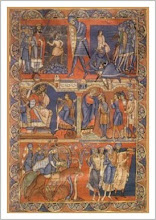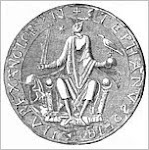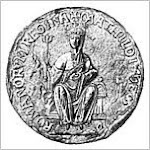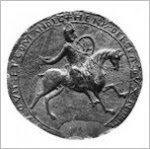A quick look at some King Stephen trivia ~ Did you know?
• Some of the castles besieged by Stephen include Exeter, Shrewsbury, Dudley, Ludlow, Wallingford, Arundel, Corfe, Leeds, Lincoln, Oxford, Faringdon, Pevensey, Worcester, and Newbury.
• When Stephen had Roger of Salisbury and his nephews arrested in 1139 among the castles he seized were Devizes, Sherborne, Newark, and Sleaford.
• In addition to Faversham Abbey where they were buried, King Stephen and his Queen, Matilda, founded Coggeshall Abbey, which was situated south of the town of Coggeshall in Essex, in 1140. They were also supporters of the Templars.
• Stephen's adherents at the Battle of Lincoln included William of Ypres, William de Warenne the 3rd Earl of Surrey, Alain de Dinan, Gilbert de Clare, Baldwin de Clare, Richard Fitz-Urse, and Ilbert de Lacy. William of Ypres was the illegitimate son of Philip of Loo who was a younger son of Robert I, Count of Flanders. Alain de Dinan married Eléonore, the daughter of Stephen, Count of Tréguier and Lord of Richmond who was the younger son of Eudes, Count of Penthièvre. William de Warenne, 3rd Earl of Surrey joined the Crusades in 1146 and was killed in battle on his way to the Holy Land. His daughter Isabel married Stephen's youngest son William of Blois who became the 4th Earl of Surrey.
• Stephen built Brightwell Castle near Wallingford in 1145. It is thought that his brother Henry, Bishop of Winchester held a manor there and that this castle was intended as both protection for the estate and as a counter to Wallingford castle which was held by Brian Fitzcount for the Empress Matilda. The castle was destroyed by Henry of Anjou in 1153.
• In 1153 Stephen appointed Richard de Lucy Constable of the Tower in London. Richard was subsequently made Chief Justiciar of England jointly with Robert de Beaumont when Henry II became king in 1154.
• Stephen fathered at least 3 and possibly 5 illegitimate children, one of whom was Gervase, Abbot of Westminster 1138 - c.1157. Prior to his marriage Stephen had been associated with a woman named Dameta who is described as a gentlewoman of Normandy.
06 February 2011
03 February 2011
Stephen's Administration
The information in this blog to date has mainly followed the conventional, widely accepted story of the reign of King Stephen. However, at this point I would like to pose a question: Can it be said with any great authority that the administration of the English realm entirely disintegrated during the years 1135-54? It can't be disputed that Stephen did make mistakes at times in his dealings with the clergy, barons, and important people such as King David of Scotland and indeed with Matilda, The Empress. The chronicle writers certainly indicate that Stephen's authority was severely eroded during the course of his reign. A commendable person with charm and many good qualities but perhaps not suitable for the harsh, ruthless reality of kingship. However, is there sufficient evidence which emphatically proves that the problems Stephen encountered led to a complete breakdown in administration? The absence of Pipe Rolls for the years 1131-54 is worth noting but cannot be taken as conclusive evidence that it did, so what do we know?
What else can we discern from those learned clerics, the chronicle writers on whom we rely so heavily for crucial information? Is there evidence of prejudice and the imposition of personal beliefs and opinion (or those of their benefactors) and second hand information to be found among their writing? Do their assessments of Stephen’s reign present as fair and balanced? For example ~
• from the Peterborough Chronicle: "When the traitors understood that he was a gentle man, and soft and good, and did not execute justice, they committed all manner of atrocity."
• from a chronicler writing under the patronage of Robert of Gloucester: "By his good nature and by the way he jested and enjoyed himself even in the company of his inferiors Stephen earned an affection that can hardly be described."
Diplomatic relations: Stephen enjoyed good relations not only with his brother Theobald of Blois and Chartres as could be expected but also in the early years of his reign with the French King Louis VI. How much was this due to their self interest? However, relations with France did eventually become more difficult during the reign of Louis VII due to the circumstances of the time. In Normandy Waleran, Count of Meulan, was given the task of overseeing matters and there was no immediate revolt against Stephen's kingship (nor in England for that matter). Indeed, Geoffrey of Anjou did not stamp his authority on the duchy until 1144. Ultimately however, it could be argued that perhaps Stephen's one and only visit to Normandy in 1137 was insufficient to keep the loyalty and confidence of the barons indefinitely especially those who held no great estates in Britain. Stephen's enduring popularity with the people of London in particular can partly be explained by the question of trade. It was in the interests of the traders of London to support the King, given his status as Count of Boulogne by right of his wife put Stephen in a commanding position to dominate/control cross-channel trade via the port of Wissant. The clergy and monastic life also continued to flourish in the years 1135-54 and contact, for good or ill, was maintained with the Popes installed in Rome during the course of Stephen's reign. It is also true however that Stephen didn't always get it right, for example, in his treatment of Roger of Salisbury in 1139.
Matters of the Realm: Stephen covered vast amounts of territory in his defence and administration of the English realm and even during times of siege and warfare received various missives about church and state matters to which he was able to effectively respond. In addition, when a situation required such action, he did not hesitate to press a siege or shirk from battle. He was able to contain the Empress, Robert of Gloucester, and their supporters primarily in the southwest of England, and after his release from imprisonment in November 1141 he was still acceptable enough to the barons to be able to resume his kingship unopposed. In addition, there were barons, such as William d'Aubigny and Simon de Senlis (Simon II of St Liz) for example, who remained loyal to Stephen throughout his reign.
The number of surviving Charters issued, approximately 720, is not insufficient for a reign of nineteen years duration, and the details of the events of 1135-54 indicate willingness on Stephen's part to negotiate and settle disputes. On the other hand a number of historians point out instances of Stephen making apparently arbitrary decisions which later gave him cause for regret. The issue of coins, although debased at one point, continued throughout Stephen's reign and the last issue continued to be in circulation until 1158. In summary, despite the civil war and the erosion of Stephen's authority, it would seem that the chancery continued to function, royal justice continued to be dispensed in the shires in many instances, and exchequer sessions continued to be held.
I'll leave the reader to ponder these matters and perhaps draw their own conclusions.
What else can we discern from those learned clerics, the chronicle writers on whom we rely so heavily for crucial information? Is there evidence of prejudice and the imposition of personal beliefs and opinion (or those of their benefactors) and second hand information to be found among their writing? Do their assessments of Stephen’s reign present as fair and balanced? For example ~
• from the Peterborough Chronicle: "When the traitors understood that he was a gentle man, and soft and good, and did not execute justice, they committed all manner of atrocity."
• from a chronicler writing under the patronage of Robert of Gloucester: "By his good nature and by the way he jested and enjoyed himself even in the company of his inferiors Stephen earned an affection that can hardly be described."
Diplomatic relations: Stephen enjoyed good relations not only with his brother Theobald of Blois and Chartres as could be expected but also in the early years of his reign with the French King Louis VI. How much was this due to their self interest? However, relations with France did eventually become more difficult during the reign of Louis VII due to the circumstances of the time. In Normandy Waleran, Count of Meulan, was given the task of overseeing matters and there was no immediate revolt against Stephen's kingship (nor in England for that matter). Indeed, Geoffrey of Anjou did not stamp his authority on the duchy until 1144. Ultimately however, it could be argued that perhaps Stephen's one and only visit to Normandy in 1137 was insufficient to keep the loyalty and confidence of the barons indefinitely especially those who held no great estates in Britain. Stephen's enduring popularity with the people of London in particular can partly be explained by the question of trade. It was in the interests of the traders of London to support the King, given his status as Count of Boulogne by right of his wife put Stephen in a commanding position to dominate/control cross-channel trade via the port of Wissant. The clergy and monastic life also continued to flourish in the years 1135-54 and contact, for good or ill, was maintained with the Popes installed in Rome during the course of Stephen's reign. It is also true however that Stephen didn't always get it right, for example, in his treatment of Roger of Salisbury in 1139.
Matters of the Realm: Stephen covered vast amounts of territory in his defence and administration of the English realm and even during times of siege and warfare received various missives about church and state matters to which he was able to effectively respond. In addition, when a situation required such action, he did not hesitate to press a siege or shirk from battle. He was able to contain the Empress, Robert of Gloucester, and their supporters primarily in the southwest of England, and after his release from imprisonment in November 1141 he was still acceptable enough to the barons to be able to resume his kingship unopposed. In addition, there were barons, such as William d'Aubigny and Simon de Senlis (Simon II of St Liz) for example, who remained loyal to Stephen throughout his reign.
The number of surviving Charters issued, approximately 720, is not insufficient for a reign of nineteen years duration, and the details of the events of 1135-54 indicate willingness on Stephen's part to negotiate and settle disputes. On the other hand a number of historians point out instances of Stephen making apparently arbitrary decisions which later gave him cause for regret. The issue of coins, although debased at one point, continued throughout Stephen's reign and the last issue continued to be in circulation until 1158. In summary, despite the civil war and the erosion of Stephen's authority, it would seem that the chancery continued to function, royal justice continued to be dispensed in the shires in many instances, and exchequer sessions continued to be held.
I'll leave the reader to ponder these matters and perhaps draw their own conclusions.
Subscribe to:
Posts (Atom)







